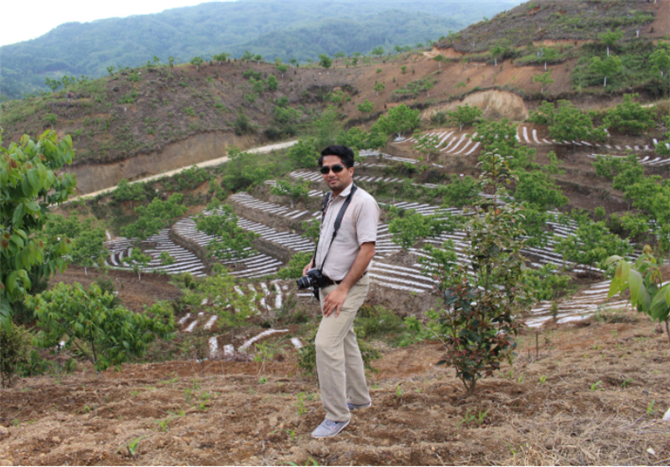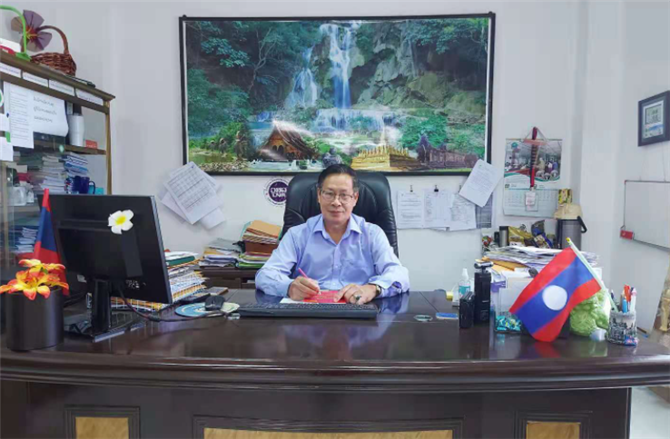COP15: Speech by President resonates with international audience
Editor's note:
"We should work together to pass rich natural heritages to future generations." "COP15 advocates 'building a shared future for all life on earth', which is not abstract concept." "I hope Bangladesh and China can strengthen cooperation in environmental governance, information sharing, and experience exchange." The just-concluded COP15 to the UN Biodiversity Convention has aroused heated discussion among the international audience, some of whom spoke highly of the keynote speech by Chinese President Xi Jinping at the event. Their common aspiration is: green cooperation will never stop, and a clean and beautiful future can be expected.
COP15 speech by President resonates with international audience
Responsibility for future generations
"Mechanisms like COP15 make it clear that we have only one earth," said Sascha Stange, deputy director of the Liaison Department of World Tourism Cities Federation.

Sascha Stange, deputy director of the Liaison Department of World Tourism Cities Federation
Sascha is a German, who came to Kunming for the conference, and he was impressed by President Xi Jinping's words at the leaders' summit of the 15th meeting of the Conference of the Parties to the Convention on Biological Diversity (COP15): “Shoulder our responsibility for future generations, make joint efforts to build a community of all life on Earth, and a clean and beautiful world for us all.” He said that the conference allowed the parties to discuss problems facing the global ecology and find solutions through exchanges and mutual learning, and these efforts are all aimed at leaving biodiversity to future generations.
"I hope that COP15 will mark a key step forward in promoting global biodiversity conservation, and through our efforts, the future generations can enjoy greater vitality of the earth,” said Sailesh Ranjitkar, a Nepalese ecologist at Kunming Institute of Botany, Chinese Academy of Sciences.

Sailesh Ranjitkar, a Nepalese ecologist at Kunming Institute of Botany
Sailesh Ranjitkar was granted a PhD degree by the Kunming institute in 2012. At present, he is a research fellow at the World Agroforestry Center and Kunming Institute of Botany, focusing on climate change, tree varieties and their related biodiversity in Yunnan and the Himalayas. By continuing the research on ecological corridors, Sailesh hoped to create better habitats so that wild animals could enjoy a free life on earth. It’s also hoped that the studies could promote the cooperation between Nepal and China, contributing to the building of ecological civilization and the harmonious coexistence between man and nature.
Green development as joint pursuit
"COP15 advocates 'building a shared future for all life on earth', which is not an empty talk," said Viang Sak, head of the protection office of the Laotian Phongsaly department of forest and agriculture. Citing as an example the joint cross-border protection of wild Asian elephants by Laos and China, Viang expounded on the ideas of joint contribution and shared responsibility. China and Laos are linked by mountains and rivers, and elephants often cross the border between south Yunnan and northern Laos. Therefore, the two sides established an elephant corridor for joint protection of wild Asian elephants.

Pasupha Chinvarasopak, minister counseller at the Royal Thai Embassy in Beijing
"Biodiversity conservation is a shared responsibility of the mankind, and we should join hands in leaving future generations rich natural heritages," said Pasupha Chinvarasopak, minister counseller for higher education, science and innovation at the Royal Thai Embassy in Beijing. In view of the Thailand-Yunnan cooperation in environment and biodiversity protection in the Lancang-Mekong river basin, Pasupha suggested that the parties should increase information sharing and learn from each other's good practices.
“As is mention by Chinese President Xi Jinping, we need to keep in mind the people’s aspiration for a better life, pursue win-win results in environmental protection, economic development, job creation, poverty alleviation and other endeavors, and increase the sense of fulfillment, happiness and security of people in all countries.” Seng Kimhang, deputy director of Radio FM 96 MHz National Cambodia in Phnom Penh, was also impressed by Xi’s speech, and he believed that the global biodiversity protection and cooperation centered on people's well-being can go a long way. Such practice will realize the sustainable development of economy, environment and society, while fulfilling harmonious coexistence between man and nature.
New chapter of cooperation
"Pakistan is a real friend of China, and I hope the ‘iron brothers’ will continue to write a new chapter in the joint protection of biodiversity." During his work in China, Muhammad Asghar, a correspondent with the Associated Press of Pakistan, has witnessed many examples that proved President Xi’s philosophy: "If we humanity do not fail Nature, Nature will not fail us."

Muhammad Asghar, a correspondent with the Associated Press of Pakistan
During COP15, Muhammad Asghar attended the meeting online, and he applauded at Xi’s announcement that “China initiates to establish a Kunming Biodiversity Fund and will take the lead by investing 1.5 billion RMB yuan to support biodiversity protection in developing countries”. Muhammad believes that COP15 will enhance the confidence of developing countries in promoting biodiversity conservation. "Facing the dual tasks of economic recovery and environmental protection, developing countries need more help and support."

Phosy Keomanivong, director general of Lao National Radio
"President Xi Jinping's keynote speech at the COP15 leaders’ summit is significant for it inspires countries in the world to balance economic development and environmental protection sensibly," said Phosy Keomanivong, director general of Lao National Radio. “Laos and China have maintained cooperation in various fields, and the railway, expressway and hydropower projects are closely related to environmental protection. Before the implementation of these cooperative projects, the two sides jointly conducted rigorous feasibility studies on protecting the natural environment, focusing on green and sustainable development."

Đỗ Văn Nam, a Vietnamese teacher at Beibu Gulf University
"Linked by mountains and rivers, Vietnam and China are closely related in environmental protection. Coupled with the friendship of "comrades plus brothers", the two countries need to work together in building a shared future for all life on earth,” said Đỗ Văn Nam, a Vietnamese teacher at the Guangxi-based Beibu Gulf University, who was touched by President Xi's speech. These are two of the quotations he can remember well: "A sound ecology and environment is not just a natural asset, but also an economic asset." "The international community must enhance cooperation, build consensus and pool strength to build a community of all life on Earth."
Chinese wisdom shared by all
"'Green mountains are gold mountains and silver mountains.’ I think this theory by Chinese President Xi Jinping has far-reaching guiding significance for global biodiversity conservation." On October 12, Su Thet Hmue, a Myanmar journalist with the online service of China Radio International, watched the COP15 leaders summit and praised President Xi's keynote speech a lot.

Su Thet Hmue, a Myanmar journalist with China Radio International
"I fully agree with his views of 'Biodiversity makes Earth full of vigor and vitality, and lays the foundation for human survival and development’ and ‘Man and Nature need to coexist in harmony’. If there’s no lucid water and lush mountains on the earth, we’ll lose the ecological balance and the basic conditions for our survival and development. By then, we will have nothing."
Shamim Abdullah Zahedy, executive editor of The Independent and Associate Editor of Independent TV, said President Xi Jinping's speech at the COP15 leaders' summit was a promise worthy of praises all over the world. Shamim noted that China's establishment of ‘a protected areas system with national parks as the mainstay’ will be an example for Bangladesh and other countries to enhance biodiversity conservation. "It is commendable that China has officially designated its first group of national parks with a total area 230,000 square kilometers and they cover nearly 30 percent of the key terrestrial wildlife species found in China.”

Shamim Abdullah Zahedy, executive editor of The Independent and Associate Editor of Independent TV in Bangladesh
Located in the Ganges Delta, Bangladesh is a densely-populated country crisscrossed by rivers. With the development of economy, the country is facing many challenges in environmental protection. In this regard, Shamim said China has valuable experience. He hoped that Bangladesh and China could strengthen cooperation in information sharing on environmental governance, which will be conducive to Bangladesh's nature and biodiversity conservation.
Reporting by Zu Hongbing, Huan Wang, Wang Shixue, Liu Ziyu, Cao Yunbo, Shen Yan, Qin Xuedan, Hu Lixian, Li Ling and Yang Xuan (Yunnan Daily); Trans-editing by Wang Shixue